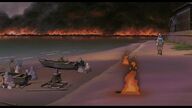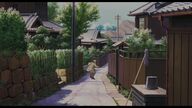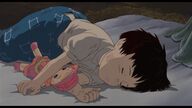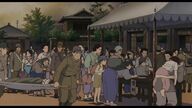This is probably the art of Grave of the Fireflies, the "art" of war.
The background of the film is actually rather vague. The introduction mentioned the Japan-US war. Isn't it actually part of World War II?
Probably this is also the source of so many people's strong criticism of this movie. As the culprit of the war, he actually made such an anti-war movie, especially the phrase "what did we do wrong" in it, which may indeed lead to a historical view. mood swings.
And this is probably the only shortcoming of this film - there is not much reflection on war.
However, as a film, even if the theme is anti-war, must the way of expression be to reflect on the source of war?
We watch and comment on the movie, not the country of Japan, the people of Japan, the government of Japan, the militarism of Japan, or the rightists.
Therefore, from the perspective of a movie alone, "Grave of the Fireflies" is real enough, delicate enough, touching enough, and profound enough.
The core content of the film is the living conditions of some Japanese nationals in the war, especially the protagonists' siblings.
My brother is a typical eldest brother in the family. He is energetic and mature at the same time, but he is still immature and even irresponsible. After all, he is only a junior high school student.
The younger sister is a typical child, innocent and lovely, pure in heart, and somewhat capricious.
The experience of the two people is indeed tragic enough. Their father joined the army and died in battle, and their mother died of injuries. They became orphans and became each other's support.
The grievances of relying on others are very clear in my heart, but I have no source of income and can only make a living by selling, depositing, begging and even stealing. It is indeed very pitiful and shameless.
When they were young, they should have enjoyed this age, but because of the war, they had to fall into such a situation. Even if they could work part-time, it was by no means the living state we hoped for, not to mention the wartime state, the job opportunities for orphans. Simply insignificant.
My sister's phrase "what did we do wrong" is really what she asked in her heart. How can a child understand the intrigue and life and death of the adult world? How can one understand the mistakes of Japanese militaristic war thinking? The only thing she can personally experience is the death of her father, the death of her mother, the reluctance to take care of her only brother, and the messy living condition. What's wrong with her?
During the process, the two of them went to live in the air-raid shelter. Bit by bit, they were not only barely surviving, but also based on the instinct of age, trying to live as happy and comfortable as possible. What's wrong with the pursuit of a better life?
The elder brother was forced to do things that violated morality and even the law, just to survive, to save his sister, some methods were indeed inappropriate, but there were also reasons for no one to guide and supervise, what could he do alone?
In the film, all the suffering, regardless of the factor of fate, is actually directly or indirectly related to the war.
If there is no war, the father may not be killed in battle, and the mother will not be killed by bombing, and the two will not be reduced to orphans and depend on each other for life; if not in the state of war, living materials will not be so tight, and my sister will not get sick and die. ;Without fighting, my brother may become a worker or something else, but he will not die because of it....
Through a detailed description of the survival of the little people in the war, it is a perfect accusation of the destruction and even the devastating impact of the war on people's lives. Thus triggering the theme of anti-war, sufficient and reasonable.
As for human emotions, this film really destroys beautiful things for us to see. In such a scene, it is normal for people to feel sad and even cry.
View more about Grave of the Fireflies reviews








